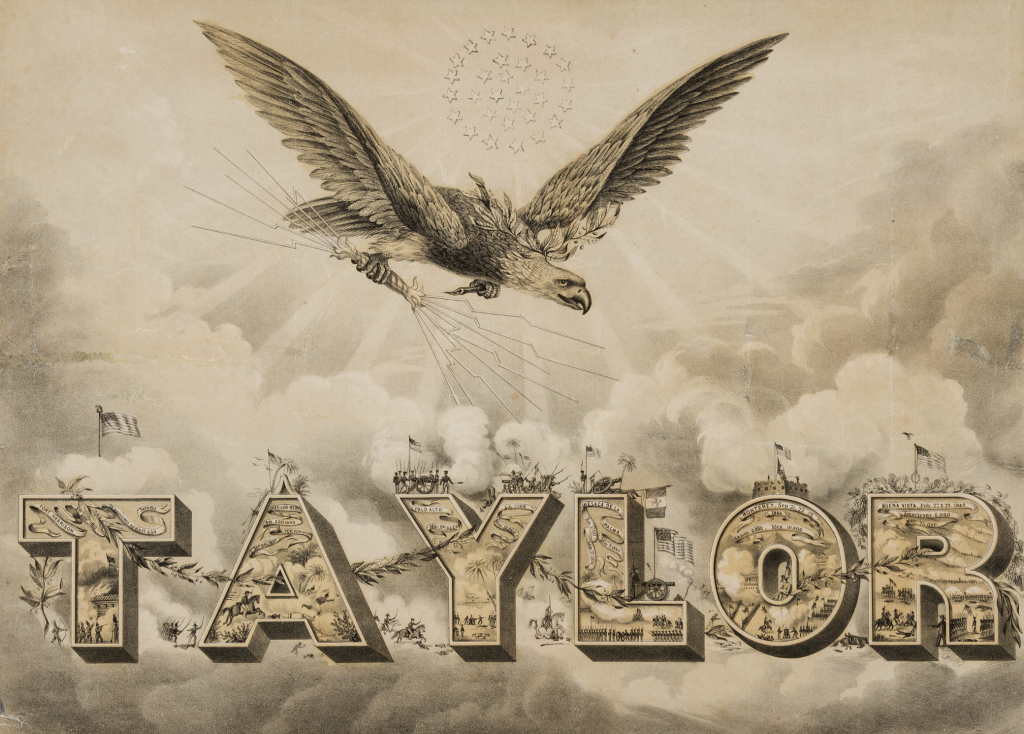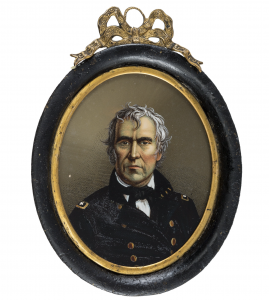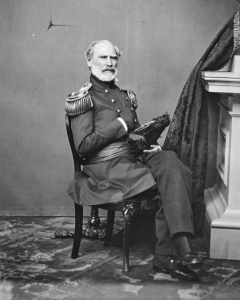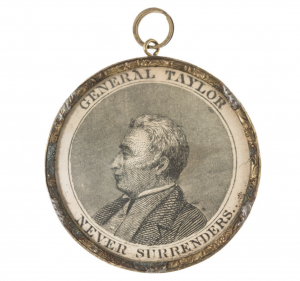What If…Zachary Taylor Was Alive During the Civil War?
 On July 9, 1850, the 12th president of the U.S. died only 16 months into his first term. But what if Zachary Taylor lived to see the Civil War? Suppose that war did not come to the U.S. sooner had he not died in office. It’s interesting to speculate what role the ex-president and general would have played during the Civil War given his extensive military experience.
On July 9, 1850, the 12th president of the U.S. died only 16 months into his first term. But what if Zachary Taylor lived to see the Civil War? Suppose that war did not come to the U.S. sooner had he not died in office. It’s interesting to speculate what role the ex-president and general would have played during the Civil War given his extensive military experience.

Five ex-presidents were alive during the Civil War: Martin Van Buren, John Tyler, Millard Fillmore, Franklin Pierce, and James Buchanan. Pierce was the only one with considerable military experience having served as a brigadier general of volunteers during the Mexican War. But he was no supporter of Lincoln or the war effort. “Franklin Pierce denounces force, and insists upon the use of “moral means,” The Farmer’s Cabinet criticized the 14th president in 1863. “The same Franklin Pierce leaped into the saddle when Mexico invaded our rights, and lead our troops in the conflict — but while Southern rebels are trampling down our free institutions and invading our free States and desolating our free homes, he cooly urges moral force alone to oppose them!”[1]

While he was a southern and slave owner, Taylor detested secession talk, and it’s possible he would have sided with the U.S. An officer claimed that in 1844 Taylor told him, “If the annexation [of Texas] should lead to an attempt to dissolve the Union, old Kentucky would, in my opinion, go with the North, but, if perchance, she should not, I shall.” Likewise, during a speech in Virginia, he cautioned listeners against disunion. “As to the Constitution and the Union,” Taylor declared, “I have taken an oath to support the one, and I cannot do so without preserving the other, unless I commit perjury, which I certainly don’t intend to do. We must cherish the Constitution to the last … preserve the Union at all hazards.” He even claimed he would take the field in person to put down a rebellion and levy an embargo on the southern states and blockade their harbors.[2] Taylor’s forgotten younger brother, Joseph Pannell Taylor, served as a U.S. brigadier general during the Civil War.[3] However, Taylor’s only son, Richard Taylor, became a successful Confederate lieutenant general. Even if Zachary Taylor avoided taking an active part in the war like other notable antebellum military heroes like Sam Houston or Alexander Doniphan, U.S. and Confederate representatives would have certainly sought his military service.

Now for the elephant in the room: What about Taylor’s age? He would have been 76 when Brigadier General Pierre G. T. Beauregard’s guns fired on Fort Sumter. While he might seem too old to take an active part in the war, it isn’t unrealistic. Field Marshal Gebhard Leberecht von Blücher was 73 when he led the Prussian forces during the Waterloo Campaign and nearly lost his life at the Battle of Ligny. John E. Wool, Taylor’s second-in-command at the Battle of Buena Vista and a U.S. major general, was 77 years old and served in various department commands during the Civil War. Lieutenant General Winfield Scott, commander-in-chief of the U.S. Army, was 75. While Scott was unable to walk a few paces at a time, could not mount a horse without pain, and suffered from other infirmities, Wool was spry for his age. It’s unlikely that Taylor would have been as fit as Wool, but perhaps he would have been in better health than 300-pound Scott.[4]
Taylor and Scott, rivals during the Mexican War, couldn’t have been more different in every regard. Scott was known for his pomp, looked magnificent in his uniform, and was a brilliant military strategist. Taylor cared little for ceremonies, looked more like a farmer that just finished tilling his field than a general, and was no genius on the battlefield. “General Taylor never made any great show or parade, either of uniform or retinue,” Ulysses S. Grant recalled in his memoirs. “In dress he was possibly too plain, rarely wearing anything in the field to indicate his rank, or even that he was an officer; but he was known to every soldier in his army, and was respected by all. I can call to mind only one instance when I saw him in uniform, and one other when I heard of his wearing it.”[5]

But what Taylor lacked in appearance and battlefield genius, he made up for with his other qualities. “Gen. Taylor’s battles were not distinguished for brilliant military manoeuvers,” Illinois representative Abraham Lincoln stated during Taylor’s eulogy. “[B]ut in all, he seems rather to have conquered by the exercise of a sober and steady judgment, coupled with a dogged incapacity to understand that defeat was possible. His rarest military trait, was a combination of negatives — absence of excitement and absence of fear. He could not be flurried, and he could not be scared.”[6] Grant also found his demeanor to be admirable. “General Taylor was not an officer to trouble the administration with his demands, but he was inclined to do the best he could with the means given to him,” he recalled. “No soldier could face either danger or responsibility more calmly than he. These qualities are more rarely found than genius or physical courage.”[7] Numerous Civil War generals who served under Taylor in Mexico revered him and emulated him during the Civil War.[8] “He [Grant] puts me in mind of old Taylor,” Major General George G. Meade observed in April 1864, “and sometimes I fancy he models himself on old Zac.”[9]
Taylor’s qualities would have made him attractive to President Lincoln during the Civil War. Perhaps Lincoln could have used him as an advisor like he and Secretary of War Edwin M. Stanton did with Major General Ethan Allen Hitchcock in the spring of 1862.[10] Or maybe Taylor might have been an option to lead the Army of the Potomac during its most turbulent years. His simple dress and casual manner, as opposed to Scott’s splendor and pomp, endeared him to citizen soldiers. Lincoln also badly needed a fighter. While he wasn’t a brilliant strategist like Scott, Taylor knew how to fight a battle. He did the best he could with what he had on hand. Lincoln wouldn’t have to worry about Taylor pestering him for reinforcements or making excuses for inaction. Taylor embodied everything that Lincoln desired in a general. He struggled to find one until Grant came along in 1864. But what if “Old Zac” had been alive?
[1] The Farmers’ Cabinet (Amherst, NH), August 6, 1863.
[2] “General Taylor on Disunion,” Lowell Daily Citizen and News (Lowell, MA), November 29, 1861; Bauer, Karl Jack. Zachary Taylor: Soldier, Planter, Statesman of the Old Southwest. Baton Rouge: Louisiana State University, 1993, 272, 303; Holman Hamilton, Zachary Taylor: Soldier in the White House (Hamden, CT: Anchor Books, 1966), 297.
[3] “Death of General Taylor,” Evening Post (New York, NY), June 29, 1864.
[4] Harwood P. Hinton and Jerry Thompson, Courage Above All Things: General John Ellis Wool and the U.S. Military, 1812-1863 (Norman: University of Oklahoma Press, 2020), 298; “Resignation of Lieut-General Winfield Scott,” Commercial Advertiser (New York, NY), November 2, 1861.
[5] Ulysses S. Grant, Personal Memoirs of U.S. Grant (New York: Charles L. Webster & Co., 1894), 62-63.
[6] Roy P. Basler, ed., The Collected Works of Abraham Lincoln, Vol 2. (New Brunswick, NJ: Rutgers University Press, 1953), 86-87.
[7] Grant, Personal Memoirs of U.S. Grant, 63.
[8] Frank Jastrzembski, “What If Someone Else Had Been Offered Command of the Army of the Potomac?” in The Great “What Ifs” of the American Civil War: Historians Tackle the Conflict’s Most Intriguing Possibilities, Chris Mackowski and Brian Matthew Jordan, eds. (El Dorado Hills, CA: Savas Beatie, 2022), 76, 84.
[9] George G. Meade, The Life and Letters of George Gordon Meade: Major-General United States Army, Vol 2 (New York: Charles Scribner’s Sons, 1913), 191.
[10] Jastrzembski, “What If Someone Else Had Been Offered Command of the Army of the Potomac?” 70-71.
Interesting “What if…”
It has been suggested that: “The Generals Scott and Taylor may have been inserted into Mexico at deliberate disadvantage, in order to ‘cause them embarrassment’ and prevent them gaining victories that would result in political reward (i.e. The Presidency). But Taylor… one-upped President James K. Polk, who had orchestrated the war with Mexico…” [Life of Grant (1865) by Edward Willett]. It was fortunate for the Nation that Zachary Taylor defeated “tool of the South” Lewis Cass in the Presidential Election of 1848, as one of the spoils of the War with Mexico – California — was fortuitously admitted, whole, as a Free State. And, had Zachary Taylor lived, perhaps his tenure as President would have produced other benefits.
As for the possible involvement in the War of the Rebellion of a “presumed-living Zachary Taylor” one complication asserts itself: Jefferson Davis was Zachary Taylor’s son-in-law. Just by being alive, would Taylor have been able to temper Davis’s crucial participation in the Disunion Movement? Despite the too-early death of his first wife, Sarah, and Jefferson’s subsequent marriage to Varina, Davis and Taylor appear to have maintained cordial, respectful relations. And without Jefferson Davis, would the Disunion Movement have progressed to the deadly-serious end game of 1861?
A great article that sent me off to wikipedia, again, as so many articles here so do. Thanks